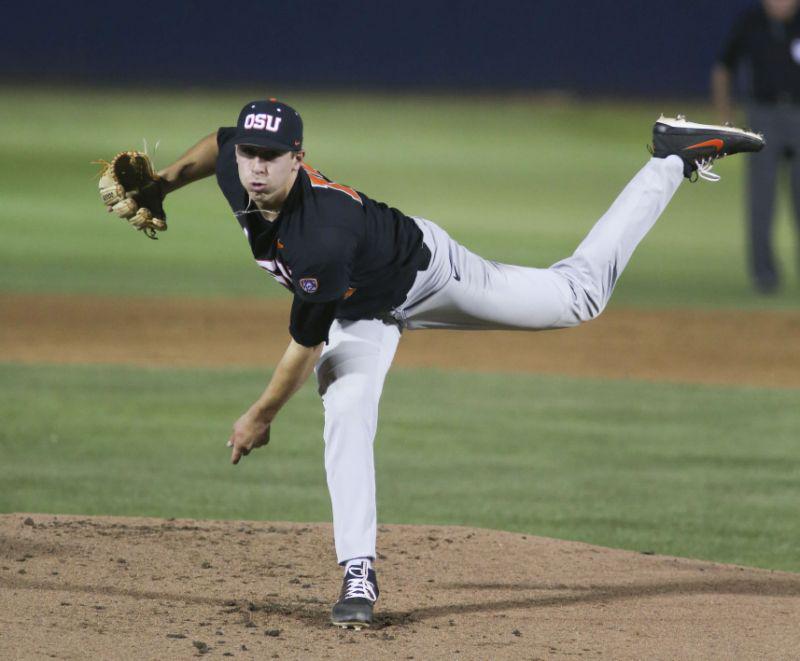|
Why a convicted child molester is likely to be chosen in the MLB draft
By Jeff Passan
[with video] Sometime over the next 48 hours, a Major League Baseball team is almost certain to ask a convicted, admitted child molester to play in its organization. It’s likeliest to happen Tuesday, during Rounds 3 through 10 of the MLB draft, or perhaps Wednesday, over the draft’s final 30 rounds. And on the off-chance that the handful of teams with Luke Heimlich on their draft boards opt against selecting him, the chance that he goes unsigned is basically zero. For more than a year now, teams have grappled with the idea of Heimlich. He is Oregon State’s ace and one of the best college pitchers in the nation; he is the signatory of a guilty plea to molesting a 6-year-old female relative when he was 15. He is a left-hander whose fastball tops out at 97 mph; he is an endless supply of bad headlines, treacherous questions and awful publicity. He is worthy of a second chance, with low recidivism rates for the crime to which he admitted; he now says that despite the guilty plea, he didn’t commit that crime, which only confuses the matter more. Sports so often stumbles as it tries to strike the balance between talent and principle, and Heimlich’s case is no exception. His eventual signing will represent a clear value judgment: that his ability as a baseball player outweighs the moral quagmire of his actions and serves as an admission that the organization will embrace someone who in his guilty plea wrote “I admit that I had sexual contact” with a little girl. It presents a litmus test that the Baltimore Orioles took last year, when they engaged in conversations with Heimlich about signing him as a non-drafted free agent, three sources familiar with the conversations told Yahoo Sports. While the sides did not strike a deal, the discussions with the Orioles showed Heimlich that even a few months after the disclosure of his case by The Oregonian, he was not entirely toxic to teams. The calculus to draft Heimlich, according to three general managers who said he is not on their boards, is simple: The amateur draft is one of the last places to reap significant surplus value. The notion of viewing Heimlich in such a manner – purely as an asset, with child molestation not a heinous act but simply a negative-value line item – is terribly cynical. “And it’s true,” one GM said. Yes, championing Heimlich as a case of the merits of rehabilitation and growth, the GM said, could allow teams to rationalize choosing him. It’s not nearly as alluring, however, as the strict value play. A player of Heimlich’s pedigree, he said, typically moves quickly through an organization, particularly because he is so polished. Every one of the nine executives surveyed by Yahoo Sports believed Heimlich, if given an opportunity, would be one of the first players from his draft class to reach the major leagues. Once there, if he’s even a league-average starter, he would be worth tens of millions of dollars annually to his team. And though none has publicly admitted to considering drafting Heimlich, a number of teams are debating whether to do so after spending the last year looking into his case, sources told Yahoo Sports. Even with a deluge of attention following stories on Heimlich from The New York Times and Sports Illustrated, one executive thinking of drafting him – who requested anonymity in case his team does not select Heimlich – said he has workshopped talking points to mitigate the expected outcry. The backlash, he said, would be severe for about 48 hours, during which the team would emphasize that Heimlich followed the terms of his plea – except for failing to update his status in Oregon’s sex-offender registry, which allowed The Oregonian to request, and eventually receive, documents from his case in Washington state. His coaches and teammates at Oregon State support him. His family stands by him. Only the mother of the victim speaks out against Heimlich. And though that is powerful, the executive said, so is Heimlich’s argument that he pleaded guilty for the sake of his family. Heimlich is religious, the executive said, and the notion of forgiveness can be far-reaching and universal.
|
.
Any original material on these pages is copyright © BishopAccountability.org 2004. Reproduce freely with attribution.
